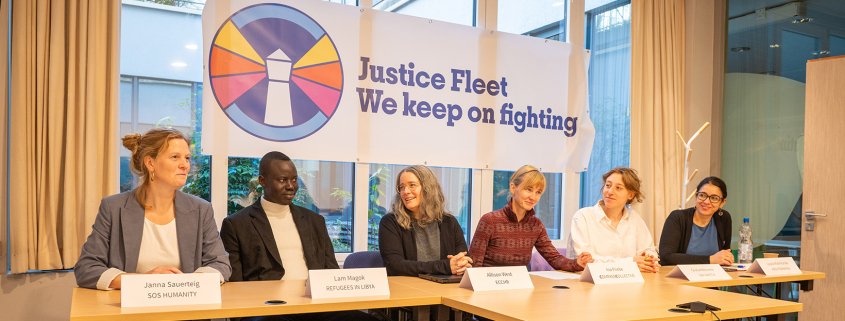The Justice Fleet Opposes EU-Funded Violence at Sea
After years of increasing human rights violations by the so-called Libyan Coast Guard in the Mediterranean, Sea-Eye—together with twelve other sea rescue organizations—is taking a decisive step: we are founding a new alliance. United, we are ending all operational communication with the so-called Maritime Rescue Coordination Centre (MRCC) in Tripoli, Libya. With this step, we are rejecting the growing pressure from the EU and the member state of Italy to cooperate with the so-called Libyan Coast Guard—an actor that, according to a new report, has committed over 60 brutal acts of violence in the past ten years.
On November 5, 2025, thirteen sea rescue organizations, including Sea-Eye, announced the founding of The Justice Fleet in Brussels—together with the European Center for Constitutional and Human Rights and Refugees in Libya. Our goal is to consistently uphold human rights and international maritime law. Therefore, we stand against the coercion by European states to communicate with violent actors at sea. As a legally sound response, the alliance has decided to end all operational communication with Libya’s Maritime Rescue Coordination Centre.
Anna di Bari, Executive Board Member of Sea-Eye, emphasizes: “The Justice Fleet shows that we are a force to be reckoned with. While the EU and its member states continue to legitimize human rights violations, we are taking a stand. We are capable of action—especially at sea. We will not communicate with those who shoot at people seeking protection and at NGOs, or who massively undermine safety.”
The Justice Fleet unites legal, political, and public strategies. It defends people seeking protection and sea rescue operations against illegal pushbacks and pullbacks as well as state repression. Deportations to Libya constitute violations of international law at sea—something repeatedly confirmed by numerous European courts, from Italy all the way to the European Court of Human Rights.
The newly launched website provides a comprehensive overview of extreme acts of violence committed by the so-called Libyan Coast Guard, as well as the first compilation of court victories achieved by sea rescue organizations since 2023.
Alliance partners from Germany, France, Italy, and Spain include:
CompassCollective, Louise Michel, Mediterranea Saving Humans, Mission Lifeline, Pilotes Volontaires, RESQSHIP, r42 – sail and rescue, Sea-Eye, Sea Punks, Sea-Watch, Salvamento Marítimo Humanitario, SOS Humanity, and TOM.

 prosto.be
prosto.be Kai Echelmeyer
Kai Echelmeyer